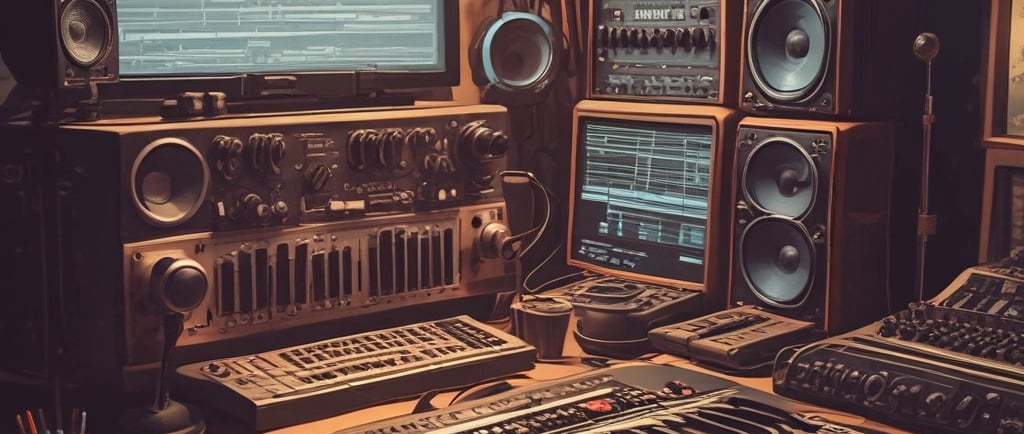Choosing the Right Music Producer: A Guide for Artists
MUSIC PRODUCTIONARTISTS
Novel Melody
7/24/20254 min read


Understanding the Role of a Music Producer
The role of a music producer is critical in the music production process, as they serve as a bridge between the artist's vision and the final recorded product. A music producer is responsible for overseeing the entire recording process, ensuring that each element of the track aligns with the intended sound and artistic direction. This includes not only technical oversight, such as managing recording sessions and coordinating with sound engineers, but also providing creative input that can significantly shape the sound and feel of the music.
Producers can vary significantly in their approach and focus. Some specialize in the technical aspects of music production, dealing with elements like mixing, mastering, and sound engineering. These producers often bring a wealth of technical knowledge and experience, ensuring that the final mix is polished and professionally produced. On the other hand, there are producers who prioritize creative contributions, working closely with artists to develop the concept of a project, select song arrangements, and refine vocal performances. This collaborative process is essential for supporting artists in achieving their musical goals.
Moreover, understanding the different types of producers is essential for artists when selecting the right fit for their project. Some producers may have a distinct genre specialization, which can influence the overall sound of a record. For instance, a producer with a background in electronic music may approach a pop project differently than one experienced in rock or classical music. Therefore, artists should evaluate the specific expertise and stylistic tendencies of potential producers to determine the best match for their unique artistic vision. This consideration will ultimately contribute to a more fulfilling and productive collaboration.
Defining Your Artistic Vision and Goals
Before embarking on the journey of selecting a music producer, it is crucial for artists to clearly define their artistic vision and goals. Understanding your genre is the first step in this process. Genres can significantly shape the direction of your music, influencing the techniques and tools a producer might utilize. For instance, if you are creating electronic music, your choice of a producer who specializes in that genre can bring out the nuances that define your sound. Equally, if you are leaning towards rock or hip-hop, a producer with experience in those fields can help you achieve an authentic sound.
Your sound preferences also play a pivotal role in this decision. Take the time to listen to various artists within your genre and identify the elements that resonate most with you. This may include specific instrumentation, production techniques, or vocal styles. By having a clear understanding of these preferences, you can effectively communicate your desired sound to potential producers, ensuring that they have a thorough grasp of your artistic intentions.
Moreover, consider the message you wish to convey through your music. Art is a powerful medium for expression, and having a clear narrative or emotional depth can be transformative. Ask yourself what themes or ideas are central to your work. This clarity will not only guide you in your creative process but will also assist in aligning with a producer who shares a similar artistic vision. When engaging in discussions with producers, articulate your aspirations effectively, as this will foster a collaborative relationship where both parties are aligned in their vision for the project. By laying this groundwork, artists can create a more cohesive and fulfilling partnership with their music producers.
Navigating the Selection Process
When it comes to finding the right music producer, a systematic approach can significantly streamline the selection process. One practical strategy is to engage in networking within the music community. Attending local gigs, open mics, and festivals provides opportunities to meet music producers in informal settings. Not only can this foster personal connections, but it can also give artists a chance to listen to the producers’ work in a live environment, which is often a good indicator of their style and capabilities.
Another advantageous avenue to explore is online music platforms. Websites such as SoundCloud, Bandcamp, and even social media platforms can be invaluable resources for discovering potential producers. Listening to various tracks allows you to assess their production quality and style, ensuring that their previous work aligns with your artistic vision. Remember to take note of producers’ profiles, as many include testimonials and previous collaborations, offering further insights into their reliability and professionalism.
Once you have identified potential candidates, the next step is to assess their suitability through initial meetings. Preparing a list of targeted questions can help gauge their experience and compatibility with your artistic direction. Inquire about their previous projects, the artists they have worked with, and their vision for your music. Additionally, discussing the producer's approach to collaboration can provide clarity on whether they prioritize creative input from artists or have a more directive style.
Establishing personal rapport is equally crucial, as the relationship between an artist and producer can significantly influence the creative process. Thus, aiming for a mutual understanding and open communication is essential. By following these strategies and maintaining a clear focus on your goals, you will be better equipped to navigate the selection process and choose the right music producer for your projects.
Collaborating Effectively with Your Producer
Collaboration between artists and music producers is a cornerstone of the music production process, leading to innovative sounds and successful outcomes. Effective communication is integral in this partnership, and establishing clear expectations from the onset can pave the way for a harmonious working relationship. Both parties should engage in detailed discussions about artistic goals, timelines, and budget constraints to ensure mutual understanding. This proactive approach minimizes misunderstandings and fosters a productive workspace.
One of the keys to a successful collaboration is the willingness to provide constructive feedback. When artists share their thoughts on the work-in-progress, it not only helps producers understand their vision but also encourages an open dialogue that enriches the creative process. Constructive feedback should be respectful, specific, and offered in a manner that is conducive to collaboration. Likewise, producers should also share their insights and suggestions, aiming to create a balanced dynamic where both voices are heard and valued.
Creativity thrives in an environment where both artist and producer feel comfortable to express their ideas. Being open to creative suggestions is essential, as it can lead to unexpected directions and enhance the overall quality of the music. However, it is crucial to strike a balance; while it is important to be flexible, artists should remain true to their core vision and ensure their artistic integrity is maintained. Should conflicts arise, addressing them promptly and calmly is vital. Engaging in active listening, being willing to compromise, and focusing on the shared goal of producing exceptional music can help resolve issues and strengthen the collaboration.
In conclusion, effective collaboration between artists and producers fosters an environment ripe for creativity and innovation. By prioritizing communication, sharing feedback, embracing open-mindedness, and maintaining healthy relationships, artists can navigate the complexities of music production successfully.
Novel Melody
Crafting music that resonate deeply.
Newsletter
© 2024. All rights reserved.
